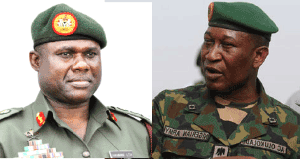The event of May 14 at the Maimalari Army Cantonment of the 7 Division of the Nigerian Army in Borno State provokes the question, ‘What is in a name?’ and perhaps offers an answer as well.
Chief of Army Staff,
Lt. Gen. Kenneth Minimah and Olukolade
Reports had it that soldiers at the military facility set up to quash insurgency in the state almost killed their General Officer Commanding (GOC), Major General Ahmadu Mohammed, while he was addressing them.
A statement issued by Defence Information Director, Major General Chris Olukolade, said the soldiers were piqued by the sight of the corpses of four of their colleagues.
“The incident occurred when the bodies of four soldiers who died in an ambush while returning from patrol duties in Chibok were being conveyed to the morgue. There is calm in the cantonment and all normal operations are on-going,” he assured.
Olukolade added, however, that the army would institute a military board of inquiry into the incident.
Some reports claimed that Mohammed escaped by the whiskers and his orderlies were injured. Other reports said the soldiers did not aim at him but shot into the air to register their protest over their dead colleagues.
The incident brings to mind the man after whom the barrack is named, the late Brigadier Ahmadu Maimalari.
Maimalari, who hailed from the majority Kanuri ethnic group in Borno State, was said to be one of Nigeria’s finest military officers in his time. He was a man who “would brook no insubordination” and because of that “exacted unqualified discipline from all his subordinates.”
Based on his core military values of professionalism and discipline, as a commanding officer (CO) of the 1st Brigade, Lagos, he attracted respect across the army establishment so much that at a point he was being looked up to as a future GOC.
But he did not live long enough to assume that position. His career was terminated on the night of January 14, 1966 when he was attacked by a set of mutineers.
The mutineers were part of a coup led by Major Chukwuma Nzeogwu, who was handling the Northern axis of the coup.
Maimalari initially escaped on foot to find his way to his garrison to rally the troops, but was eventually killed before he could reach there.
These accounts are stated in part or in full in these books on Nigeria’s first coup d’etat – The Nigerian Five Majors by Ben Gbulie and Why We Struck by Wale Ademoyega, among others.
Forty-eight years after Maimalari’s death, his state is enmeshed in a serious problem. Insurgents hold it by the jugular, and the army was compelled to establish a new garrison, known as 7 Division with headquarters in Maiduguri, close to Maimalari’s ancestral home.
As a sign of honour to his memory, the headquarters was named after him.
Mohammed is the third GOC of the division since its formation last year.













